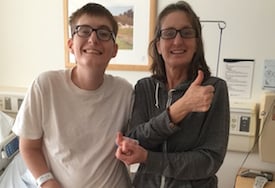The National Center for Health Statistics has designated a specific ICD-10 code for Prader-Willi syndrome (PWS). Previously PWS was included as one of number of genetic disorders ICD-10-CM code Q87.1, which contains a large group of genetic disorders associated with short stature. However, the genetic causes, medical complications, and treatment of these disorders are very different.
 Beginning October 1, PWS will have a unique code. The new, dedicated ICD-10-CM code for PWS (Q87.11 Prader-Willi syndrome) will make it much easier to track medical care and outcomes in the PWS population. This designation will facilitate research studies aimed at understanding the true prevalence of PWS, the factors contributing to morbidity and mortality, and the outcomes of patient care and treatment.
Beginning October 1, PWS will have a unique code. The new, dedicated ICD-10-CM code for PWS (Q87.11 Prader-Willi syndrome) will make it much easier to track medical care and outcomes in the PWS population. This designation will facilitate research studies aimed at understanding the true prevalence of PWS, the factors contributing to morbidity and mortality, and the outcomes of patient care and treatment.
“We’re thrilled to have this unique ICD-10 code for PWS, which will facilitate research studies and improve patient care”, said Theresa Strong, Director of Research Programs at FPWR. “ The new ICD-10 code will allow scientists to conduct epidemiologic research on PWS, determine true mortality rates, recruit patients for clinical trials, track outcomes of clinical interventions, and develop protocols for standard of care.
We’re grateful to the Prader-Willi Syndrome Association (USA) and the International Prader-Willi Syndrome Organisation (IPWSO) who partnered with us to advance the ICD-10 proposal, to the many PWS experts who contributed to the development of the proposal, and to Dr. Dan Driscoll, who presented the proposal to the ICD-10-CM Coordination and Maintenance Committee.”







